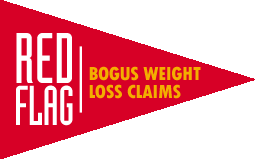If the claim looks too good to be true, it probably is.
Did you know… Weight Loss Products promising incredible – too good to be true outcomes still appear regularly in mainstream media. 
Despite claims to the contrary, there are no magic bullets or effortless ways to burn off fat. The only way to lose weight is to lower caloric intake and/or increase physical activity. Claims for diet products or programs that promise weight loss without sacrifice or effort are generally bogus. And some can even be dangerous. Did you know that weight loss in excess of 2 pounds per week can be dangerous?
While these too good to be true claims may vary (for example, patches, clips, body wraps, insoles or “diet teas”), the claims are almost always the same – dramatic, effortless weight loss without diet or exercise.
It takes only a few minutes to become familiar with examples of incredible and outrageous weight loss claims. These claims can be conveyed in many ways, like “lose 30 pounds in 30 days” and some claims may contain conflicting statements. It is the overall message that has the greatest effect on your audience. Generally, countless testimonials and can be more powerful than body copy when consumers read about weight loss claims.
Some of the following weight loss claims refer to “substantial weight loss.” This means “a lot of weight loss” and would include weight loss of over 2 pounds a week for an extended time.
The next time you get an ad or spot for a nonprescription drug, dietary supplement, diet patch, diet cream, weight loss wrap, weight loss earring or other weight loss product that is worn on the body or rubbed into the body containing claims like the ones below, Red Flag the ad: Take your time to ask, is this too good to be true?
| A claim is too good to be true if it says the product will… |


